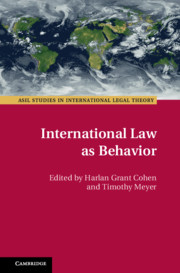Book contents
- International Law As Behavior
- ASIL Studies in International Legal Theory
- International Law As Behavior
- Copyright page
- Dedication
- Contents
- Tables
- Contributors
- Acknowledgments
- 1 International Law As Behavior
- 2 Deadlines As Behavior in Diplomacy and International Law
- 3 Cooperating without Sanctions
- 4 Egocentric Bias in Perceptions of Customary International Law
- 5 Explaining the Practical Purchase of Soft Law
- 6 Toward an Anthropology of International Law
- 7 Transnational Collaborations in Transitional Justice
- 8 Advancing Neuroscience in International Law
- 9 The Missing Persons of International Law Scholarship
- 10 The Wrong Way to Weigh Rights
- Index
6 - Toward an Anthropology of International Law
Published online by Cambridge University Press: 15 March 2021
- International Law As Behavior
- ASIL Studies in International Legal Theory
- International Law As Behavior
- Copyright page
- Dedication
- Contents
- Tables
- Contributors
- Acknowledgments
- 1 International Law As Behavior
- 2 Deadlines As Behavior in Diplomacy and International Law
- 3 Cooperating without Sanctions
- 4 Egocentric Bias in Perceptions of Customary International Law
- 5 Explaining the Practical Purchase of Soft Law
- 6 Toward an Anthropology of International Law
- 7 Transnational Collaborations in Transitional Justice
- 8 Advancing Neuroscience in International Law
- 9 The Missing Persons of International Law Scholarship
- 10 The Wrong Way to Weigh Rights
- Index
Summary
With the growing importance of global legal institutions, new forms of global law, and transnational social movements around legal issues, anthropologists are studying the multiplicity of sites where international law operates. By drawing on anthropological literature and applying ethnographic tools in their own analysis, legal scholars can gain insights into how international law is produced and operates in practice. An anthropological approach can be applied to study a range of legal phenomena, including the organizational behavior of international institutions, the internalization of international legal norms in local communities, and regulatory tools of global governance. It can uncover the reasons why certain laws are adopted and internalized, the process by which laws are enforced, the interaction between legal and non-legal norms, and the internal decision-making of legal institutions. This chapter analyses the unique insights that anthropology contributes to our understanding of international law behavior and illustrates the value of an anthropological approach by providing a case-study of the culture of the World Bank, based on extensive ethnographic research.
- Type
- Chapter
- Information
- International Law as Behavior , pp. 128 - 157Publisher: Cambridge University PressPrint publication year: 2021
- 1
- Cited by

